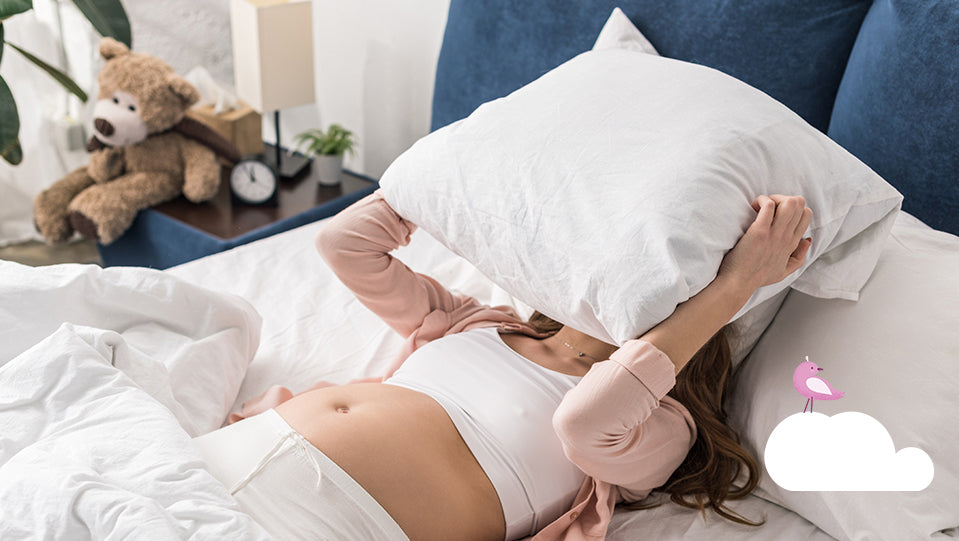It’s a well-known fact by any new and expecting parents, that having a new born baby goes hand in hand with sleep-deprivation. What is less well-known (until you have been there, then you know all too well!), is that for mum, the struggle with sleep can start very early on in your pregnancy. The change of hormones in your body when you're pregnant can really throw you of kilter, and effect your sleep. That paired with the aches and pains that come with growing a little human- it’s not easy! Symptoms vary depending on the person, the stage in your pregnancy, and even pregnancy to pregnancy! We’ve tried to outline a few of the niggles that are commonly experienced in each trimester, along with a few tips to hopefully ease these for you!
First Trimester
Increased trips to the toilet
People often complain of their bladder being squashed in pregnancy, making them need to frequent the bathroom a lot more often. Though this does happen, it’s not a problem until the later stages of pregnancy. In the first trimester, the increased need for the toilet is actually because the blood flow to your kidneys increases by about 35-60% during these earlier stages of pregnancy, making you produce 25% more urine. This peaks between 9-16weeks, and then settles down, and then you’re fairly safe until the last 3 months when the bladder will start to get intruded upon as mentioned above. Our tip to ease this is not to drink any fluids after dinner, and try to avoid caffeine in the afternoon!
Headaches
Fluctuating hormones can bring on some quite strong headaches; the increase in progesterone in the early stages of pregnancy can cause your blood vessels to dilate causing headaches, sometimes they can be so severe they can keep you from getting to sleep at night. Our tip: stay hydrated and get plenty of rest, even if it’s not necessarily sleep! You can also try a cold, damp towel on your forehead to contract the blood vessels and ease some tension in your head.
Sore breasts
As your milk ducts start growing and maturing, it’s quite likely you’ll experience some soreness. If you are a belly sleeper, this might affect your sleep! Our tip: invest in a full length body support pillow, the Growbright one is very soft and cuddly so it should help you sleep a little more comfortably.
'Morning' sickness/ nausea
I think we all know that ‘morning’ sickness can happen any (and all) times of the day! Trying to get to sleep while you feel nauseous or like you need to throw up at any given second is not fun, or conducive to getting a good sleep! Our tip: try eating a light snack that is high in protein and complex carbs just before you go to sleep, you are less likely to be hungry in the morning. A banana muffin, some cheese or a handful of dried apricots are all good options.
Second Trimester
Heartburn
As your baby grows and starts to put pressure on your stomach and digestive track. Heartburn is common in all stages of pregnancy, but many women find it gets worse in the second and third trimesters (as your baby gets bigger). Our tip: Avoid acidic foods like citrus, tomatoes, coffee and juice. It also helps to try and stay upright at least 4 hours leading up to bedtime, this will help keep your stomach acids in the stomach.
Muscle cramps
Muscle cramps are very common in the second trimester, the cause is thought to be due to the pressure put on the nerves and blood vessels from your growing uterus. It’s the worst thing when you have finally overcome some of the already mentioned sleep niggles, only to get woken up with awful leg cramps/pains! So, our tip is to include more calcium in your diet, or talk to your doctor or nutritionist about some supplements that can help.
Third Trimester
Back, pelvis and hip pain
Growing a baby requires your body to go through a lot of changes, these changes go hand in hand with discomfort unfortunately. The hormones released during pregnancy also cause a softening of the back and pelvic ligaments. This is compounded by the ever-increasing size and weight of your growing baby and the loss of core muscle support as the abdominal muscles are stretched. This results in a shift in your center of gravity and the end result is a lot of extra pressure and strain on the spine. Our tip: side sleeping is advocated as the best position to sleep in during pregnancy - especially in your third trimester. Try lying on your side using your pregnancy pillows to add extra support where it is now needed. Use a firm but comfortable pillow for your head and place another pillow between your knees and ankles to help keep your pelvis stacked and minimize strain on the pelvic ligaments. Place a small pillow under your stomach to relieve any tension or strain on your pelvis and back from the weight of the bump. Some pregnant women find full-length body pillows provides the best relief.
Anxiety
As your due date approaches, the stress and anxiety around giving birth, and your new life as a parent can be a big one for keeping you up at night! Some people experience very vivid and intense dreams, others have trouble turning their minds off, experiencing insomnia and very poor sleep quality. Our tip: We find it helps to have a check list of everything you need to get done, and check them off as you go. Headspace also have some good sleepcasts to help you wind down and take your mind off these stresses.
Once baby has arrived, your sleep will be largely affected by their sleep schedule. If you want some tips on new born sleep, we have a lot of blogs on this topic that might help!

